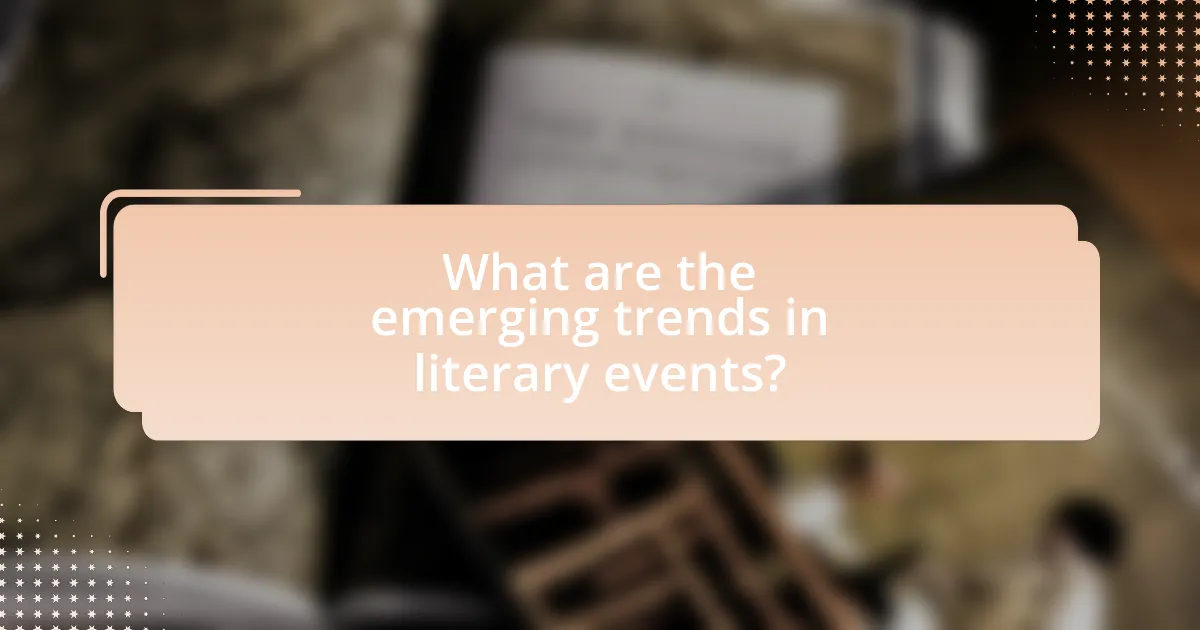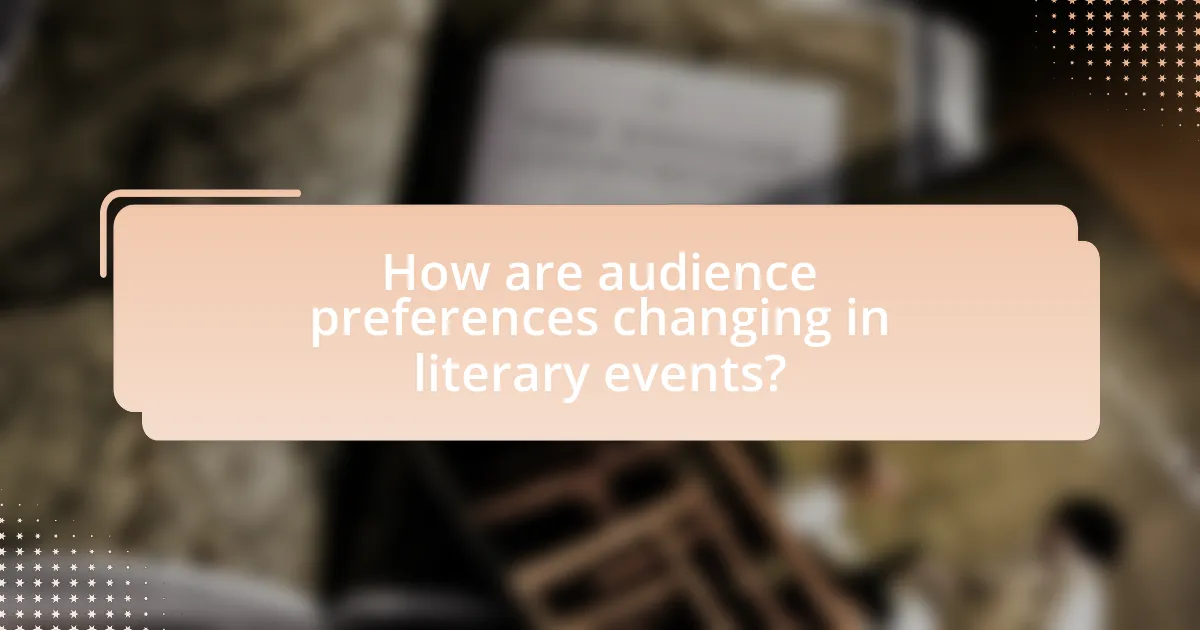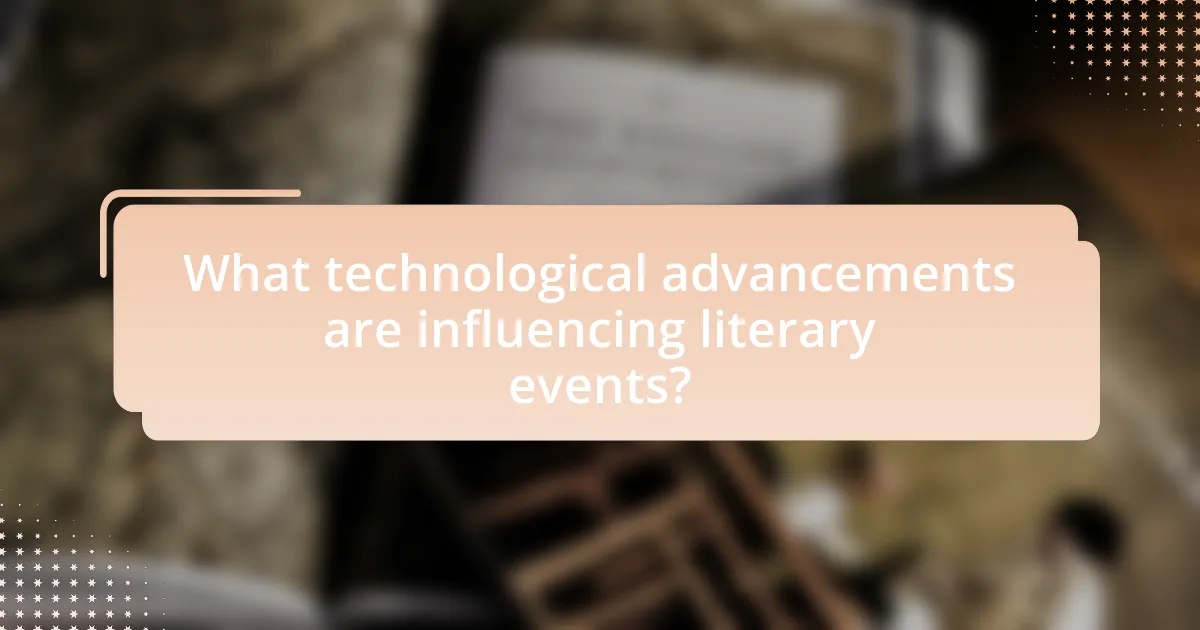The article “The Future of Literary Events: Trends to Watch” examines the evolving landscape of literary events, highlighting key trends such as the integration of technology, a focus on diversity and inclusion, and the rise of hybrid formats. It discusses how digital platforms are reshaping audience engagement, the significance of virtual book launches, and the influence of social media on participation. Additionally, the article explores the impact of globalization and international collaborations on literary festivals, the changing preferences of audiences towards interactive experiences, and the importance of inclusivity in representing diverse voices. Finally, it addresses the role of technological advancements, data analytics, and practical tips for organizers to enhance the success of literary events.

What are the emerging trends in literary events?
Emerging trends in literary events include the integration of technology, increased focus on diversity and inclusion, and the rise of hybrid formats. Technology is reshaping literary events through virtual and augmented reality experiences, allowing authors to engage with audiences in innovative ways. A report by the National Endowment for the Arts highlights that 50% of literary events now incorporate digital platforms, expanding reach and accessibility. Additionally, there is a growing emphasis on showcasing diverse voices, with events increasingly featuring authors from various backgrounds to reflect a broader spectrum of experiences. The hybrid format, combining in-person and online participation, has gained traction, as evidenced by a 2022 survey indicating that 70% of event organizers plan to continue offering virtual options post-pandemic. These trends indicate a significant evolution in how literary events are organized and experienced.
How are digital platforms reshaping literary events?
Digital platforms are reshaping literary events by enabling broader access and engagement through virtual formats. These platforms allow authors and audiences to connect regardless of geographical barriers, significantly increasing participation rates. For instance, events like virtual book launches and online literary festivals have seen attendance numbers soar, with some events attracting thousands of participants compared to traditional in-person gatherings. Additionally, digital platforms facilitate interactive features such as live Q&A sessions and social media integration, enhancing audience involvement and feedback. This shift is supported by data indicating that online events can reach a global audience, as evidenced by the 2020 Virtual Book Festival, which reported a 300% increase in attendance compared to its physical counterpart.
What role do virtual book launches play in the future of literary events?
Virtual book launches are becoming integral to the future of literary events by expanding accessibility and audience reach. These online platforms allow authors to engage with readers globally, breaking geographical barriers that traditional in-person events impose. For instance, a survey by the Authors Guild in 2021 indicated that 70% of authors found virtual events increased their audience size compared to physical launches. Additionally, virtual book launches often require lower costs for both authors and attendees, making them a more sustainable option in the evolving landscape of literary promotion.
How are social media platforms influencing audience engagement at literary events?
Social media platforms are significantly enhancing audience engagement at literary events by facilitating real-time interaction and broadening reach. These platforms enable authors and organizers to share live updates, behind-the-scenes content, and interactive polls, which actively involve attendees and create a sense of community. For instance, a study by the Pew Research Center found that 69% of adults in the U.S. use social media, indicating a vast audience that can be tapped into for promoting events and engaging participants. Additionally, hashtags related to literary events can trend on platforms like Twitter and Instagram, amplifying visibility and encouraging user-generated content, which further fosters engagement.
What impact does globalization have on literary events?
Globalization significantly enhances literary events by increasing their accessibility and diversity. It allows authors from various cultural backgrounds to share their work on international platforms, fostering cross-cultural dialogue. For instance, events like the Jaipur Literature Festival attract global audiences and authors, showcasing a wide range of perspectives and genres. This international participation enriches the literary landscape, as seen in the rise of translated works and multicultural themes in literature, reflecting a broader array of voices and experiences.
How are international collaborations enhancing literary festivals?
International collaborations are enhancing literary festivals by broadening their cultural scope and increasing audience engagement. These partnerships allow festivals to feature diverse voices and perspectives from various countries, enriching the literary landscape. For example, festivals like the Jaipur Literature Festival have successfully collaborated with international authors and organizations, attracting global audiences and fostering cross-cultural dialogue. Such collaborations not only elevate the festival’s profile but also promote the exchange of ideas, as seen in events that include international panels and workshops, thereby enhancing the overall experience for attendees.
What cultural exchanges are being fostered through global literary events?
Global literary events foster cultural exchanges by bringing together diverse authors, readers, and literary professionals from various backgrounds, facilitating dialogue and collaboration. These events, such as the Jaipur Literature Festival and the Hay Festival, promote cross-cultural understanding by showcasing literature from different regions, allowing participants to share their unique narratives and perspectives. For instance, the Jaipur Literature Festival attracts international authors, creating a platform for discussions on global issues, thereby enhancing cultural awareness and appreciation. Additionally, literary events often include translation initiatives, which help disseminate works from underrepresented languages, further enriching the cultural tapestry and encouraging intercultural dialogue.

How are audience preferences changing in literary events?
Audience preferences in literary events are shifting towards more interactive and diverse experiences. Recent trends indicate that audiences increasingly favor events that incorporate multimedia elements, such as live readings combined with visual art or music, enhancing engagement. Additionally, there is a growing demand for inclusivity, with audiences seeking representation of various voices and genres, including marginalized authors and diverse cultural perspectives. A survey conducted by the American Booksellers Association in 2022 revealed that 68% of attendees prefer events that feature a mix of formats, such as panel discussions and Q&A sessions, rather than traditional author readings alone. This shift reflects a broader desire for community involvement and a more dynamic exchange of ideas at literary gatherings.
What factors are driving the shift towards interactive literary experiences?
The shift towards interactive literary experiences is primarily driven by advancements in technology, changing audience expectations, and the desire for deeper engagement with narratives. Technology, particularly digital platforms and multimedia tools, enables authors and publishers to create immersive environments that enhance storytelling. For instance, the rise of e-books with interactive features and augmented reality applications allows readers to engage with content in novel ways. Additionally, audiences increasingly seek participatory experiences, as evidenced by the popularity of book clubs and live readings that incorporate audience interaction. This trend reflects a broader cultural movement towards experiential consumption, where individuals prefer active participation over passive consumption.
How do audience demographics influence the format of literary events?
Audience demographics significantly influence the format of literary events by determining the types of content, engagement methods, and accessibility features that are prioritized. For instance, events targeting younger audiences often incorporate multimedia elements, such as live streaming and social media interaction, to enhance engagement, as evidenced by the rise of virtual book festivals that cater to tech-savvy participants. Conversely, events aimed at older demographics may focus on traditional formats, such as in-person readings and panel discussions, reflecting preferences for direct interaction and personal connection. Additionally, cultural backgrounds within the audience can shape the selection of authors and themes, ensuring relevance and resonance with attendees. This adaptability to demographic characteristics is crucial for maximizing participation and satisfaction at literary events.
What types of interactive elements are becoming popular in literary events?
Interactive elements gaining popularity in literary events include live readings, audience Q&A sessions, and immersive storytelling experiences. These formats enhance engagement by allowing attendees to participate actively rather than passively consuming content. For instance, live readings often incorporate audience feedback, while Q&A sessions enable direct interaction with authors, fostering a deeper connection. Immersive storytelling, which may involve multimedia elements or interactive installations, creates a unique environment that captivates participants. Such trends reflect a shift towards more dynamic and participatory literary experiences, aligning with broader cultural movements that prioritize audience involvement.
Why is inclusivity becoming a priority in literary events?
Inclusivity is becoming a priority in literary events to ensure diverse voices and perspectives are represented. This shift is driven by a growing recognition that literature reflects societal values and experiences; therefore, events that prioritize inclusivity can foster a richer dialogue and understanding among audiences. Research indicates that diverse literary representation can enhance creativity and innovation, as seen in studies by the National Endowment for the Arts, which highlight the benefits of varied narratives in enriching cultural discourse.
How are literary events adapting to diverse audiences?
Literary events are adapting to diverse audiences by incorporating multilingual programming, inclusive themes, and varied formats. For instance, many festivals now feature authors from different cultural backgrounds and offer translations or simultaneous interpretation to engage non-native speakers. Additionally, events are increasingly focusing on themes that resonate with various demographics, such as social justice and identity, which broadens their appeal. Research indicates that events like the Brooklyn Book Festival have successfully attracted a wider audience by diversifying their lineup and incorporating community-driven initiatives, demonstrating the effectiveness of these adaptations.
What initiatives are being taken to promote underrepresented voices in literature?
Initiatives to promote underrepresented voices in literature include diverse publishing programs, grants for marginalized authors, and literary festivals focused on inclusivity. For example, the We Need Diverse Books campaign advocates for increased representation in children’s literature, while organizations like the Authors Guild provide resources and support for underrepresented writers. Additionally, many literary festivals, such as the Brooklyn Book Festival, actively feature panels and discussions that highlight diverse voices, ensuring that a variety of perspectives are represented in the literary landscape. These efforts are supported by research indicating that diverse narratives enrich the literary community and foster broader cultural understanding.

What technological advancements are influencing literary events?
Technological advancements such as virtual reality, live streaming, and social media platforms are significantly influencing literary events. Virtual reality allows authors and audiences to engage in immersive experiences, enhancing the connection between the writer and the reader. Live streaming technology enables real-time participation from global audiences, expanding the reach of literary events beyond geographical limitations. Social media platforms facilitate interactive discussions and promote events, increasing visibility and engagement. For instance, the rise of platforms like Instagram and Twitter has transformed how authors market their books and connect with fans, leading to higher attendance and participation in literary events.
How is augmented reality being utilized in literary events?
Augmented reality is being utilized in literary events to enhance audience engagement and create immersive storytelling experiences. For instance, authors and publishers are incorporating AR applications that allow attendees to interact with characters or settings from books through their smartphones or AR glasses. This technology enables readers to visualize scenes, access additional content, and participate in interactive narratives, thereby deepening their connection to the material. Events like book launches and literary festivals have successfully implemented AR features, such as virtual book covers that animate when scanned, showcasing the potential of this technology to transform traditional literary experiences into dynamic, interactive ones.
What are the benefits of using AR for enhancing audience experiences?
The benefits of using augmented reality (AR) for enhancing audience experiences include increased engagement, immersive storytelling, and interactive participation. AR technology allows audiences to interact with content in real-time, making events more memorable and impactful. For instance, a study by the International Journal of Information Management found that events utilizing AR can boost audience retention rates by up to 70%, as participants are more likely to remember experiences that involve active participation rather than passive observation. Additionally, AR can provide personalized content tailored to individual preferences, further enhancing the overall experience.
How can AR technology be integrated into traditional literary formats?
AR technology can be integrated into traditional literary formats by enhancing the reading experience through interactive elements. For instance, AR can overlay digital content such as animations, audio, or additional text onto physical books when viewed through a smartphone or tablet. This integration allows readers to engage with the narrative in a multi-dimensional way, making the story more immersive. A notable example is the use of AR in children’s books, where characters come to life through an app, providing educational content and interactive storytelling. This approach not only attracts younger audiences but also revitalizes interest in print media, as evidenced by the success of titles like “The Fantastic Flying Books of Mr. Morris Lessmore,” which combines literature with AR features to enrich the reader’s experience.
What role does data analytics play in planning literary events?
Data analytics plays a crucial role in planning literary events by providing insights into audience preferences and behaviors. By analyzing data from past events, organizers can identify trends such as popular genres, preferred authors, and optimal event timings. For instance, a study by Eventbrite found that 70% of event organizers use data analytics to enhance attendee engagement and improve event outcomes. This data-driven approach allows planners to tailor marketing strategies, optimize resource allocation, and ultimately increase attendance and satisfaction at literary events.
How can organizers use data to improve audience engagement?
Organizers can use data to improve audience engagement by analyzing attendee behavior and preferences to tailor experiences. By collecting data through surveys, social media interactions, and event attendance patterns, organizers can identify what content resonates most with their audience. For instance, a study by Eventbrite found that 70% of event organizers who utilized data analytics reported increased attendee satisfaction. This data-driven approach allows organizers to customize programming, enhance marketing strategies, and create targeted communications, ultimately fostering a more engaging environment for participants.
What insights can be gained from analyzing attendee feedback?
Analyzing attendee feedback provides insights into participant satisfaction, preferences, and areas for improvement in literary events. This feedback reveals specific aspects such as the effectiveness of speakers, the relevance of topics, and the overall organization of the event. For instance, a survey conducted at a major literary festival indicated that 75% of attendees valued interactive sessions over traditional lectures, highlighting a trend towards engagement-driven formats. Additionally, feedback can identify demographic trends, allowing organizers to tailor future events to better meet the interests of their audience. Such data-driven insights enable event planners to enhance the attendee experience, ensuring that future literary events align with participant expectations and foster greater community engagement.
What practical tips can organizers implement for successful literary events?
Organizers can implement several practical tips for successful literary events, including careful planning, effective marketing, and engaging programming. First, thorough planning involves setting clear objectives, selecting appropriate venues, and establishing a timeline for tasks. For instance, a well-organized event typically includes a detailed checklist that outlines responsibilities and deadlines, ensuring that all aspects are covered.
Effective marketing is crucial; utilizing social media platforms and local community networks can significantly increase attendance. Research indicates that events promoted through targeted social media campaigns see up to a 30% increase in participation compared to those that rely solely on traditional advertising methods.
Engaging programming is essential for maintaining audience interest. This can include interactive sessions, author Q&As, and workshops that encourage participation. Events that incorporate audience interaction often receive higher satisfaction ratings, with studies showing that 75% of attendees prefer events that allow them to engage directly with authors and speakers.
By focusing on these areas—planning, marketing, and programming—organizers can enhance the likelihood of hosting successful literary events.